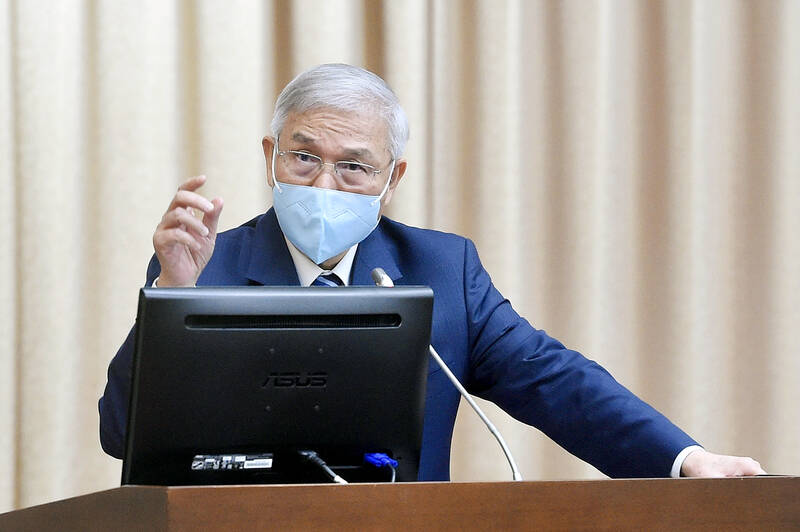Taiwan’s inflation remains controllable and would decline to the central bank’s target territory next year, central bank Governor Yang Chin-long (楊金龍) said yesterday.
Global supply chain disruptions, energy and raw material prices hikes, and the local currency’s depreciation have played a part in inflation’s rise in Taiwan, Yang said during a speech at Academia Sinica in Taipei’s Nangang District (南港).
The central bank has set an inflation target of 2 percent to keep consumer prices low and stable.

Photo: CNA
The bank in September forecast that the consumer price index (CPI) would grow 1.88 percent next year, slightly higher than the 1.86 percent the Directorate-General of Budget, Accounting and Statistics projected yesterday afternoon.
Inflation has hovered around 3 percent in the past few months.
Yang said global supply chain snarls during the COVID-19 pandemic pushed up energy and raw material prices, and the situation deteriorated earlier this year after Russia’s invasion of Ukraine.
Taiwan, which relies heavily on imported energy and raw materials, is susceptible to price movements, he said.
Imported inflation became more evident amid the depreciation of the local currency, Yang said.
The average price of imported goods last month grew 11.17 percent in US dollar terms, but spiked 17.1 percent in New Taiwan dollar terms, because the local currency has fallen 5 percent against the greenback this year, he said.
The NT dollar is expected to fall 6 percent against the US dollar this year, which would contribute 0.15 to 0.3 percentage points to the CPI, which would be tolerable, Yang said.
Government agencies have assisted by cutting taxes on imported energy and raw materials, and had earlier frozen electricity prices, he said.
The central bank has predicted that GDP would grow 2.99 percent next year and is to update its forecast next month.
International research bodies have said the US and Europe might enter recession next year, facilitated by drastic monetary tightening.
Yang said he is not sure if stagflation would occur as it did during the oil crisis in the 1970s, but conceded that there are tough challenges ahead.
The US Federal Reserve has said that it would raise interest rates further to bring inflation down to 2 percent, from 7.7 percent, even at the cost of job losses and economic pain.
Such a drastic move is not necessary in Taiwan in light of controllable inflation, Yang said, adding that the central bank would make policy decisions based on the nation’s needs.
Yang in September said that the central bank could press ahead with, slow down or halt monetary tightening next month after factoring in the latest economic data.

MULTIFACETED: A task force has analyzed possible scenarios and created responses to assist domestic industries in dealing with US tariffs, the economics minister said The Executive Yuan is tomorrow to announce countermeasures to US President Donald Trump’s planned reciprocal tariffs, although the details of the plan would not be made public until Monday next week, Minister of Economic Affairs J.W. Kuo (郭智輝) said yesterday. The Cabinet established an economic and trade task force in November last year to deal with US trade and tariff related issues, Kuo told reporters outside the legislature in Taipei. The task force has been analyzing and evaluating all kinds of scenarios to identify suitable responses and determine how best to assist domestic industries in managing the effects of Trump’s tariffs, he

TIGHT-LIPPED: UMC said it had no merger plans at the moment, after Nikkei Asia reported that the firm and GlobalFoundries were considering restarting merger talks United Microelectronics Corp (UMC, 聯電), the world’s No. 4 contract chipmaker, yesterday launched a new US$5 billion 12-inch chip factory in Singapore as part of its latest effort to diversify its manufacturing footprint amid growing geopolitical risks. The new factory, adjacent to UMC’s existing Singapore fab in the Pasir Res Wafer Fab Park, is scheduled to enter volume production next year, utilizing mature 22-nanometer and 28-nanometer process technologies, UMC said in a statement. The company plans to invest US$5 billion during the first phase of the new fab, which would have an installed capacity of 30,000 12-inch wafers per month, it said. The

Taiwan’s official purchasing managers’ index (PMI) last month rose 0.2 percentage points to 54.2, in a second consecutive month of expansion, thanks to front-loading demand intended to avoid potential US tariff hikes, the Chung-Hua Institution for Economic Research (CIER, 中華經濟研究院) said yesterday. While short-term demand appeared robust, uncertainties rose due to US President Donald Trump’s unpredictable trade policy, CIER president Lien Hsien-ming (連賢明) told a news conference in Taipei. Taiwan’s economy this year would be characterized by high-level fluctuations and the volatility would be wilder than most expect, Lien said Demand for electronics, particularly semiconductors, continues to benefit from US technology giants’ effort

‘SWASTICAR’: Tesla CEO Elon Musk’s close association with Donald Trump has prompted opponents to brand him a ‘Nazi’ and resulted in a dramatic drop in sales Demonstrators descended on Tesla Inc dealerships across the US, and in Europe and Canada on Saturday to protest company chief Elon Musk, who has amassed extraordinary power as a top adviser to US President Donald Trump. Waving signs with messages such as “Musk is stealing our money” and “Reclaim our country,” the protests largely took place peacefully following fiery episodes of vandalism on Tesla vehicles, dealerships and other facilities in recent weeks that US officials have denounced as terrorism. Hundreds rallied on Saturday outside the Tesla dealership in Manhattan. Some blasted Musk, the world’s richest man, while others demanded the shuttering of his